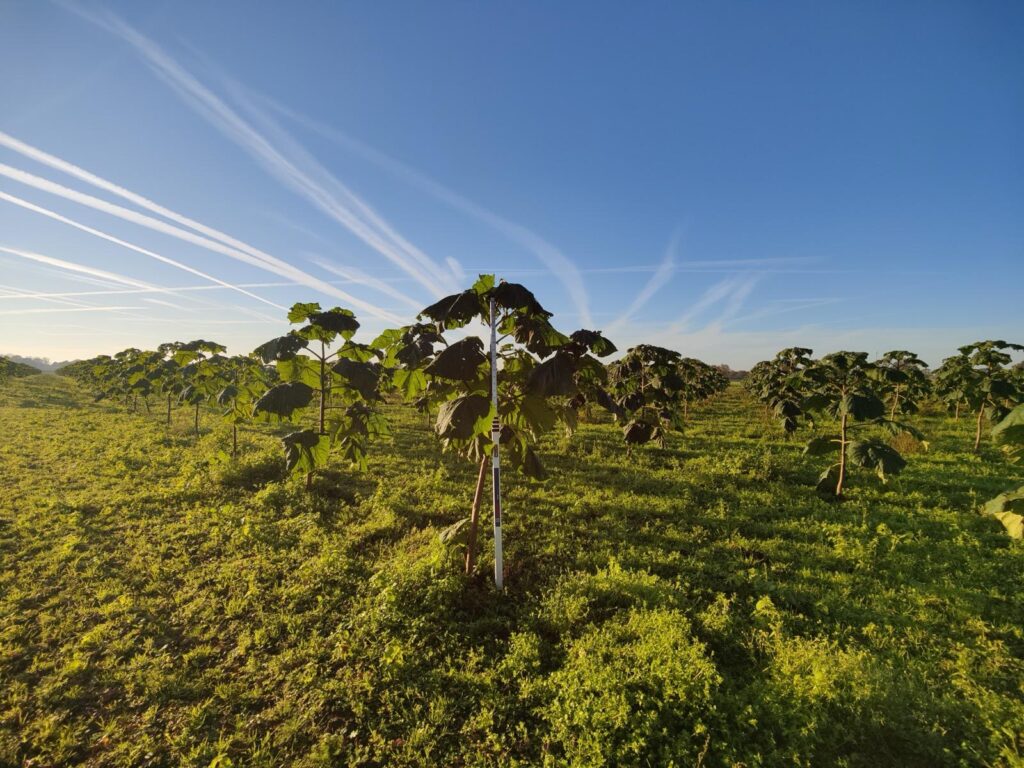This innovative agroforestry project establishes Paulownia plantations across the Netherlands on marginal or underutilised land. By combining high-yield timber production with long-term carbon sequestration, the project provides a scalable, nature-based solution to the climate crisis while promoting innovation in low-impact material use.
Over the course of its 40-year lifespan, the project aims to mitigate over 1.2 million tonnes of CO₂e by planting Paulownia trees in agroforestry configurations. These fast-growing trees are known for their exceptional carbon absorption capacity and strong regenerative properties. All plantations are managed using organic practices, without chemical inputs or irrigation, and the harvested wood will be used in durable construction or furniture applications—ensuring long-term carbon storage.
PROBA.2024.0002
Registered
The Netherlands

ARR (Afforestation, Reforestation and Revegetation)
1,202,618 tCO₂e over the 40-year crediting period

Jun 1, 2023 – Dec 31, 2063
Agroforestry innovation, circular material use, low-impact land regeneration, long-term carbon removals
The project has a strong commitment to environmental and sustainable development that benefit local communities through the following contributions:
Environment
By converting low-productivity land into carbon-sequestering Paulownia plantations, the project enhances biodiversity, restores degraded soils, and supports long-term land regeneration. Paulownia trees rapidly develop deep root systems that improve water retention and prevent erosion. Their large canopies also provide microhabitats for pollinators and other species. The use of zero irrigation and zero chemicals reinforces the project’s low ecological footprint while maximising natural regeneration.
Community
The project introduces a forward-thinking agroforestry model to the Netherlands, supporting innovation in rural land management and sustainable materials. By promoting local knowledge transfer and new supply chains for lightweight, fast-maturing hardwood, the initiative provides economic benefits to regional actors without displacing food production or competing with traditional land uses. Farmers and landowners are empowered to integrate carbon-positive practices into their operations, setting a precedent for scalable reforestation in temperate Europe.
Climate Action
The project will remove over 1.2 million tonnes of CO₂e during its 40-year crediting period. This is achieved through the natural growth cycle of non-invasive Paulownia trees, whose fast biomass accumulation leads to high rates of carbon capture. To ensure long-term impact, harvested timber is redirected toward durable applications like building materials and furniture, where carbon remains stored for decades. The project’s transparent monitoring, long-term planning, and zero-emissions model align directly with national and EU climate goals.




GOAL 9 – Industry, Innovation, and Infrastructure

GOAL 12 – Responsible Consumption and Production
One Tribe enables businesses to be more sustainable by funding rainforest protection projects that store carbon from being released into the atmosphere. By enabling customers to protect rainforest when they shop online we also empowers consumers to drive positive change
One Tribe is a Climate Action Platform enabling businesses and their customers to make a positive environmental impact.



Eric currently works as an independent consultant at the intersection of nature and climate, focused on catalysing market and non-market solutions to drive the just transition.
He previously was Head of Product at Earthshot Labs, supporting nature conservation and restoration projects across the global south secure project finance. Prior to Earthshot Labs, Eric led nature-based carbon project development for Gorongosa National Park in Mozambique and founded the Carbon Cooperative, a global alliance of leading nature conservation and restoration practitioners exploring carbon finance. After serving in the Peace Corps in Mozambique out of university, he spent much of his 20s working in community-based conservation and ecosystem restoration efforts in Sub-Saharan Africa interspersed with two startup ventures as co-founder and CEO of a mental health tech startup and COO of a sustainable coffee company. Eric has a dual Masters in Environmental Engineering and Environmental Policy from Stanford University where he was a NSF Graduate Research Fellow and a BS in Environmental Engineering from Tufts University.
Alan is a risk management thought-leader, superconnector, and FinTech pioneer. His mission is to enable an Earth Positive economy which includes nature in global accounting systems.
Alan is Founder of Generation Blue, a venture studio dedicated to planetary game changers powered by exponential technologies. Previously, Alan established Natural Capital Markets at Lykke AG, pioneering blockchain based forestry and carbon backed tokens. Alan has over two decades of risk management experience advising global financial institutions, and was a founding member of the RiskMetrics Group, a JPMorgan spin-off. Alan is an investor and advisor to regenerative impact ventures, including TreeBuddy.Earth, Regenativ, and Vlinder Climate.
Lori Whitecalf made history when she became the first woman to be elected Chief of Sweetgrass First Nation in 2011. She served three terms of office from 2011-2017.
Lori took a two-year hiatus from leadership to expand the family ranch and serve as the FSIN Senior Industry Liaison. She was re-elected on November 29. 2019 and again on November 30, 2021, as Chief of Sweetgrass. Chief Whitecalf practises a traditional lifestyle of hunting, fishing and gathering. She currently sits on the following boards: Saskatchewan Indian Institute of Technology, FSIN Lands and Resource Commission, Battle River Treaty 6 Health Centre and Battleford Agency Tribal Chiefs Executive Council, FSIN Women’s Commission.
Tina is the Chief Business Officer for MLTC Industrial Investments, the Economic Development arm of the Meadow Lake Tribal Council. She has a diverse background of experience. Having spent 15 years as a municipal Chief Operating Officer, 20 years involved in Saskatchewan’s Health Authority Board Keewatin Yatthe and 9 years with Northern Lights Board of Education.
She continues as a Board Member with Beaver River Community Futures supporting small business development in her home region. Tina brings a wealth of experience in a variety of fields and many connections to the Indigenous communities of Northern Saskatchewan. In addition Tina holds a BA Advanced from the U of S, a Certificate in Local Government Authority from the U of R and is certified as a Professional Economic Developer for Saskatchewan and a certified Technician Aboriginal Economic Developer (TAED).
Tootoosis’ career spans 40+ years in HRM, political leadership, and Indigenous economic development, as a dedicated bridge builder and advocate for Indigenous causes.
As a key member of the Saskatoon Regional Economic Development Authority (SREDA) team since 2021, he develops strategies for the Truth and Reconciliation Commission final report and Call to Action #92.
He is a graduate of the First Nations University of Canada and a certified Professional Aboriginal Economic Developer. Spearheading various community initiatives while serving as a Chair of the SIEDN while directing ILDII and WIBF. Founder of MGT Consulting Tootoosis is based in Saskatoon, Treaty Six Territory.
Cy Standing (Wakanya Najin in Dakota) has a long and distinguished career including serving overseas as an Electronics Technician in the Royal Canadian Air Force, former Chief of Wahpeton Dakota Nation, former Vice Chief of the Federation of Saskatchewan Indigenous Nations (FSIN), past Executive Director of Community Development Branch of the Department of Northern Saskatchewan as well as an Order in Council appointment to the Federal Parole Board.
Mr. Standing has served as a Director on many Profit and Non-Profit Corporate Boards, including serving as a Director for Affinity Credit Union with assets of over six billion dollars as well as IMI Brokerage and Wanuskewin and is currently a member of the One Tribe Indigenous Carbon Board.